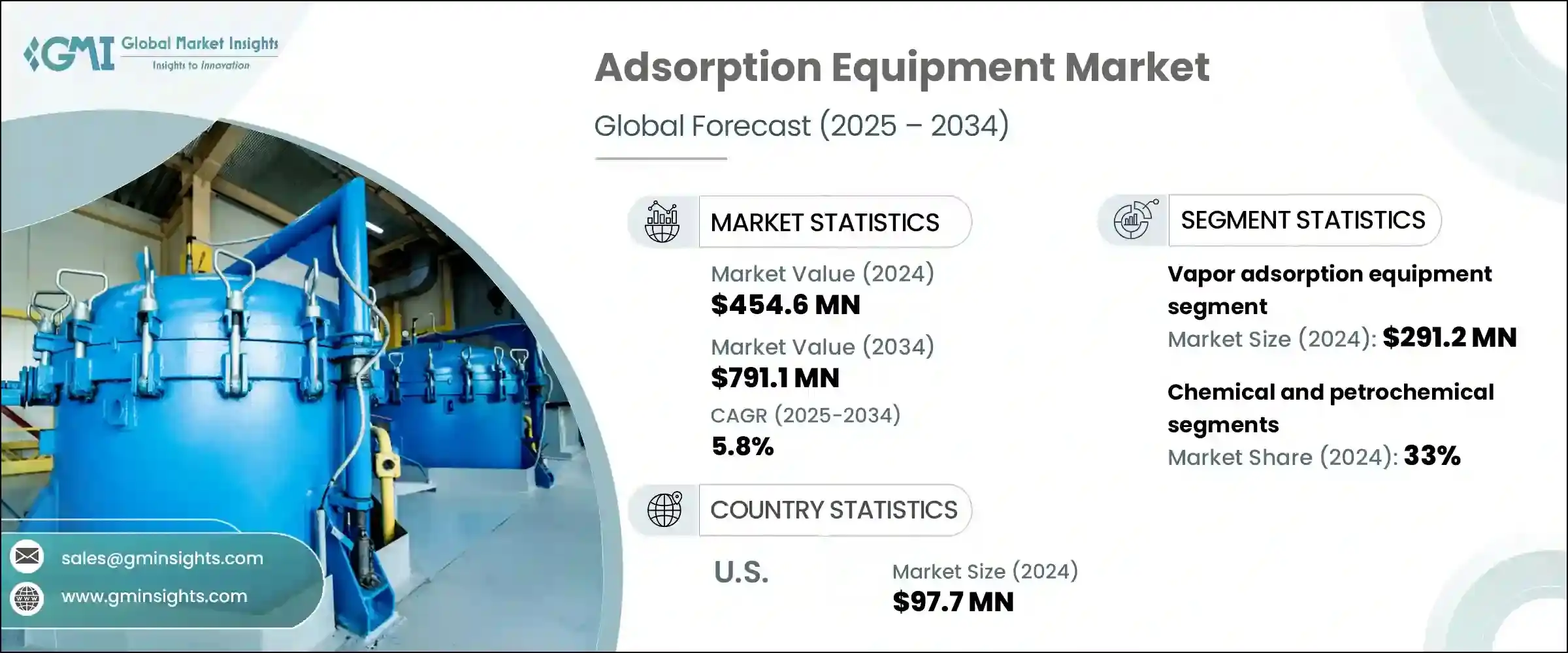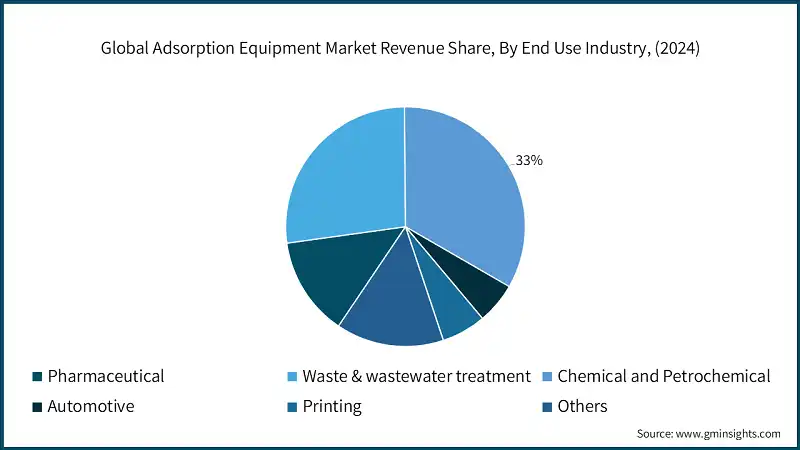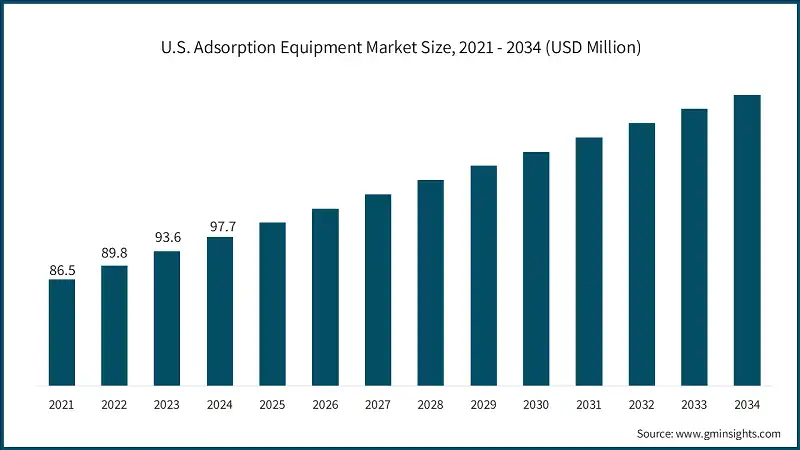Summary
Table of Content

Adsorption Equipment Market
Get a free sample of this report
Form submitted successfully!
Error submitting form. Please try again.
Thank you!
Your inquiry has been received. Our team will reach out to you with the required details via email. To ensure that you don't miss their response, kindly remember to check your spam folder as well!

Request Sectional Data
Thank you!
Your inquiry has been received. Our team will reach out to you with the required details via email. To ensure that you don't miss their response, kindly remember to check your spam folder as well!
Form submitted successfully!
Error submitting form. Please try again.
Adsorption Equipment Market Size
The global adsorption equipment market size was valued at USD 454.6 million in 2024 and is estimated to grow at a CAGR of over 5.8% from 2025 to 2034. Governments are implementing strict regulations to reduce air and water pollution. For example, the United States Environmental Protection Agency (EPA) enforces the Clean Air Act and Clean Water Act, which require industries to limit emissions and discharge of pollutants. Adsorption equipment, such as activated carbon filters and molecular sieves, helps industries like manufacturing, automotive, and petrochemicals comply with these regulations.

To get key market trends
According to the World Health Organization (WHO), 2 billion people globally lack access to safe drinking water, driving the demand for water purification technologies. Activated carbon systems are widely used for water treatment as they remove toxins, organic compounds, and heavy metals. These systems are essential for municipal water treatment and industrial applications, including food and beverage production.
Adsorption Equipment Market Report Attributes
| Key Takeaway | Details |
|---|---|
| Market Size & Growth | |
| Base Year | 2024 |
| Market Size in 2024 | USD 454.6 Million |
| Forecast Period 2025 - 2034 CAGR | 5.8% |
| Market Size in 2034 | USD 791.1 Million |
| Key Market Trends | |
| Growth Drivers |
|
| Pitfalls & Challenges |
|
What are the growth opportunities in this market?
Innovations in adsorption materials and technologies are improving the efficiency and cost-effectiveness of these systems. For instance, metal-organic frameworks (MOFs) and advanced types of activated carbon are making adsorption processes more effective. The global adsorption equipment market is also benefiting from the pharmaceutical and food & beverage sectors, which require high-quality raw materials and water. Adsorption equipment ensures the removal of impurities, maintaining the safety and quality of final products. According to the Food and Agriculture Organization (FAO), the global food and beverage industry is projected to grow at a compound annual growth rate (CAGR) of 5.1% from 2023 to 2028, further driving the demand for adsorption technologies.
The adsorption equipment market is growing due to several factors, including stricter environmental regulations, increasing demand for clean water, concerns about air quality, industrial growth, and advancements in adsorption materials. For example, the global water treatment market, which includes adsorption technologies, was valued at USD 283.6 billion in 2022 and is expected to grow at a CAGR of 6.5% during the forecast period (2024-2029), according to the International Water Association (IWA). These trends highlight the critical role of adsorption equipment in addressing environmental and industrial challenges.
Adsorption Equipment Market Trends
Technological advancements and changing industry needs are transforming the adsorption equipment business. There is a growing preference for advanced adsorbents that deliver better results, higher efficiency, and lower costs. For example, traditional adsorbents like activated carbon are being replaced or used alongside materials such as zeolites, metal-organic frameworks (MOFs), and graphene-based substances. These advanced materials offer higher adsorption capacity, faster reaction times, and better selectivity. This leads to improved system performance, less frequent regeneration of adsorbents, and more environmentally friendly operations.
Additionally, the use of artificial intelligence (AI) and machine learning in adsorption systems is increasing. These technologies help optimize processes, predict maintenance needs, and improve overall performance. For instance, AI can analyze real-time data to estimate how much adsorption capacity remains and adjust the use of adsorbents accordingly. This reduces maintenance costs and extends the life of the adsorbents. Machine learning models can also analyze sensor data to predict when adsorbents are nearing saturation or when maintenance is required, which helps reduce downtime and improve efficiency.
According to the U.S. Department of Energy, adsorption technologies are widely used in industries such as water treatment, air purification, and chemical processing. The Environmental Protection Agency (EPA) highlights that advanced adsorbents like activated carbon are critical for removing contaminants from water and air, with activated carbon alone accounting for over 70% of adsorbent use in water treatment applications in the United States.
Adsorption Equipment Market Analysis

Learn more about the key segments shaping this market
Based on product type, the market can be segmented into vapor adsorption equipment and liquid adsorption equipment. The vapor adsorption equipment segment accounted for revenue of around USD 291.2 million in 2024 and is estimated to grow at a CAGR of around 5.9% from 2025 to 2034.
Vapor adsorption equipment removes gases and volatile compounds from air and industrial exhaust. It is used for air purification, removing VOCs, and separating gases. The demand for these systems is growing due to increasing air pollution and the need for cleaner air, especially in cities. Industries like automotive (for exhaust gas treatment), pharmaceuticals, and manufacturing are using these systems more often.
Liquid adsorption removes impurities, toxins, and organic compounds from water and other liquids. It is used in industries like food & beverage, pharmaceuticals, and chemicals. The growing problem of water scarcity and the need for clean water are driving the use of liquid adsorption technologies. Water treatment plants use this equipment to remove contaminants such as heavy metals, pesticides, and organic pollutants.

Learn more about the key segments shaping this market
Based on the end use industry, the global adsorption equipment market is categorized as pharmaceutical, waste & wastewater treatment, chemical and petrochemical, automotive, printing and others. The chemical and petrochemical segments held around 33% of the market share in 2024 and is anticipated to grow at a CAGR of 6.2% during 2025 to 2034.
The chemical and petrochemical industries deal with contaminants like VOCs, gases, and organic solvents. Adsorption plays an important role in improving safety, cutting emissions, and recovering useful materials. Technologies like pressure swing adsorption (PSA) and vacuum swing adsorption (VSA) are being used more to separate gases and make natural gas processing and biogas upgrading more efficient.
In the waste and wastewater treatment sector, adsorption is widely used to remove contaminants from water, air, and soil. It works well for treating industrial wastewater, municipal water, and removing harmful compounds from effluents. The rising need for clean drinking water and stricter rules for effluent treatment are pushing the use of adsorption technologies, especially in areas with water shortages and pollution problems.

Looking for region specific data?
In terms of the country, the U.S. dominates with an overall North America adsorption equipment market and valued at USD 97.7 million in 2024 and is estimated to grow at a CAGR of over 5.7% from 2025 to 2034. Key drivers such as strict environmental regulations, a focus on sustainability, rising demand for clean air and water, and advancements in adsorbents and systems are fueling the market growth.
In the U.S., stringent regulations from the Environmental Protection Agency (EPA) and state authorities aim to reduce industrial pollution and improve air and water quality. These regulations are pushing industries to adopt adsorption-based systems to meet quality standards. Industries are increasingly seeking process optimization, efficiency, and cost reduction, boosting the demand for adsorption systems. The chemical and petrochemical sectors, especially in natural gas processing, oil refining, and solvent recovery, are driving this demand. Adsorption is essential for gas separation, VOC control, solvent recovery, and emission reduction in these industries.
Country-level Analysis
North America: In terms of the country, the US dominates with an overall revenue share of around 72% in North America adsorption equipment market, driven by strict environmental regulations, a focus on sustainability, rising demand for clean air and water, and advancements in adsorbents and systems.
On the other hand, Canada adsorption equipment industry expressing notable growth rate of around 6% till 2034, due to environmental regulations, industrial demands, and technological advancements.
Europe: The Europe adsorption equipment market held around 26% revenue share in 2024 and anticipated to grow with a CAGR of around 5.6% during 2025 to 2034, driven by strict EU environmental standards, technological progress, and industrial needs. Europe leads globally in environmental regulation to reduce pollution and combat climate change.
In terms of country, Germany adsorption equipment market expressing notable growth rate of around 6.2% till 2024. Germany growth in engineering and industrial innovation, leading the development of next-generation adsorbents and advanced adsorption processes to meet the demand for efficient and sustainable systems.
Asia Pacific: The Asia Pacific adsorption equipment market accounted for around 32% revenue share in 2024 and anticipated to grow with a CAGR of around 6.2% during 2025 to 2034, fueled by environmental concerns, industrial demand, technological advancements, and stricter regulations. Countries are adopting stricter environmental laws to address air pollution, water contamination, and climate change.
In terms of country, China is dominating the Asia Pacific adsorption equipment market in terms of revenue share of around 35% in 2024. China is implementing stringent policies like the Air Pollution Prevention and Control Action Plan and the Water Pollution Prevention and Control Action Plan to combat severe pollution. These regulations are pushing industries to adopt cleaner technologies, including adsorption equipment for air and water treatment.
Adsorption Equipment Market Share
In 2024, key companies like Microtrac, Durr, CECO Environmental, Calgon Carbon and Evoqua held a combined market share of 20%-25%. These companies are actively engaging in mergers, acquisitions, facility expansions, and collaborations to enhance their product portfolios, reach more customers, and strengthen their market positions.
Microtrac makes tools to measure particles, including systems for gas adsorption. Their products include analyzers for surface area and pore size, tools to test catalysts, and equipment for high-pressure gas adsorption. These tools are used in industries like pharmaceuticals, chemicals, and materials science for research and quality checks. The company has offices in the United States and Japan, with main offices in Montgomeryville, Pennsylvania, and Osaka, Japan.
Dürr AG is a company from Germany that builds machines and plants. It is based in Bietigheim-Bissingen, Germany. Dürr makes systems for surface treatment, cleaning exhaust air, and environmental technology. Their Sorpt.X CA systems remove harmful gases (VOCs) from industrial exhaust. These systems are used in industries like automotive, chemicals, and pharmaceuticals, which must follow strict emission rules. Dürr works worldwide, offering solutions that protect the environment and improve efficiency.
CECO Environmental is a U.S. based company. It focuses on controlling air pollution and improving industrial processes. Based in Dallas, Texas, CECO makes products like adsorption systems, wet scrubbers, and filters. These products are used in industries such as automotive, chemical processing, and pharmaceuticals to reduce emissions and meet environmental rules. CECO is known for its focus on innovation and sustainability, making it a trusted name in environmental solutions.
Adsorption Equipment Market Companies
Major players operating in the adsorption equipment industry are:
- Bry-Air
- Calgon Carbon
- Carbtrol
- CECO Environmental
- Durr
- Evoqua
- General Carbon
- GUNT
- KCH
- Microtrac
- Munters
- Process Combustion Corporation
- Suny Group
- Thermax
- TIGG
Manufacturers are heavily investing in R&D to develop more efficient adsorbents and adsorption systems. New materials like metal-organic frameworks (MOFs) and graphene are enhancing performance and cost-effectiveness in various applications. Companies are expanding into emerging markets such as Asia Pacific, Africa, and Latin America. These regions, experiencing rapid industrialization, urbanization, and environmental concerns, are driving demand for adsorption-based solutions in water treatment, air purification, and pollution control.
Adsorption Equipment Industry News
- In February 2025, Munters agreed to sell its FoodTech Equipment division to Grain & Protein Technologies (GPT) for MEUR 97.5. This sale is part of Munters' plan to focus more on digital solutions in the FoodTech sector. The deal includes five production facilities, one assembly hub, three sales offices, and about 400 employees worldwide.
- In November 2024, Donaldson launched a new range of compressed air dryer systems that are more reliable and energy-efficient. The HRS+, HRS-L+, and HRE+ product lines are designed to meet changing customer needs and show Donaldson’s focus on improving air filtration and drying technologies.
- In October 2023, Calgon Carbon Corporation completed expanding its Pearlington, Mississippi facility. The addition of a second production line for virgin activated carbon significantly boosts capacity. Now, Calgon Carbon, the leading manufacturer of activated carbon and reactivation services, will produce over two hundred million pounds of virgin activated carbon annually.
This adsorption equipment market research report includes in-depth coverage of the industry with estimates & forecast in terms of revenue (USD Million) & volume (Thousand Units) from 2021 to 2034, for the following segments:
Market, By Product Type
- Vapor adsorption equipment.
- Liquid adsorption equipment
Market, By Flow Rate
- Up to 10,000 CFM
- 10,000 - 20,000 CFM
- More than 20,000 CFM
Market, By End Use Industry
- Pharmaceutical
- Waste & wastewater treatment.
- Chemical and Petrochemical
- Automotive
- Printing
- Others (pesticide, coating etc.)
Market, By Distribution Channel
- Direct sales
- Indirect sales
The above information is provided for the following regions and countries:
- North America
- U.S.
- Canada
- Europe
- UK
- Germany
- France
- Italy
- Spain
- Russia
- Asia Pacific
- China
- India
- Japan
- South Korea
- Australia
- Latin America
- Brazil
- Mexico
- MEA
- UAE
- Saudi Arabia
- South Africa
Frequently Asked Question(FAQ) :
Who are the key players in adsorption equipment market?
Some of the major players in the adsorption equipment industry include Evoqua, General Carbon, GUNT, KCH, Microtrac, Munters, Process Combustion Corporation, Suny Group, Thermax, TIGG.
What is the size of vapor adsorption equipment segment in the adsorption equipment industry?
The vapor adsorption equipment segment generated over USD 291.2 million in 2024.
How much is the U.S. adsorption equipment market worth in 2024?
The U.S. adsorption equipment market was worth over USD 97.7 million in 2024.
How big is the adsorption equipment market?
The adsorption equipment market was valued at USD 454.6 million in 2024 and is expected to reach around USD 791.1 million by 2034, growing at 5.8% CAGR through 2034.
Adsorption Equipment Market Scope
Related Reports


